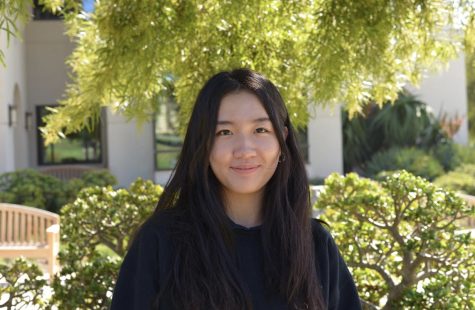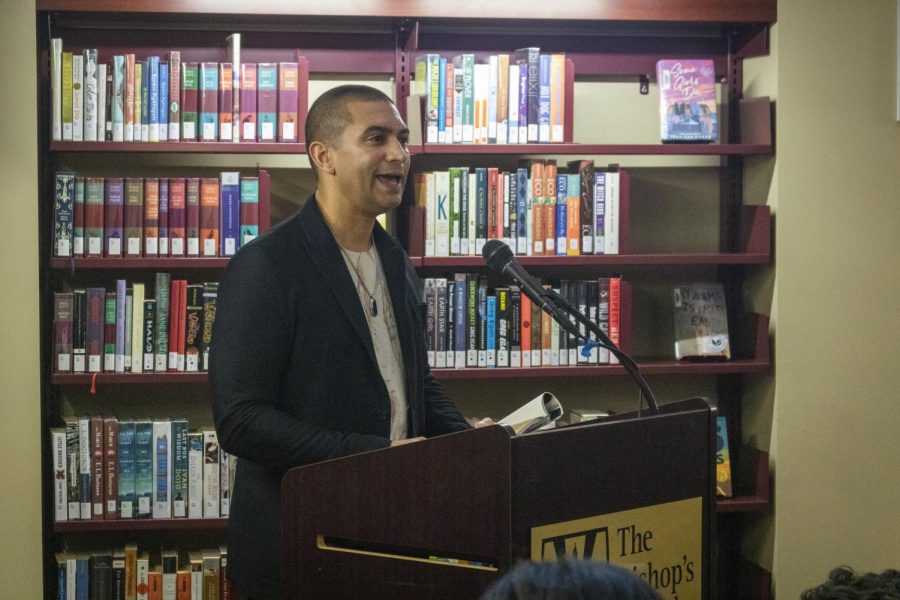Poet in Action: Mr. Adrian Matejka, Newest Editor of Poetry Magazine
While sharing select pieces of his works from The Big Smoke, Map to the Stars, and Somebody Else Sold the World, Mr. Adrian Matejka also revealed much of his inspiration behind the drafting process such as his relationship with his daughter.
“The air around us was so ripe, it might / have broken in half if we could touch it.” —Adrian Matejka, Somebody Else Sold the World.
If you are a sophomore, junior, or senior, you have likely read and even met the illustrious author of The Big Smoke, Map to the Stars, and Somebody Else Sold the World. Mr. Adrian Matejka was this school year’s first visiting poet of Bishop’s Robert Mulgrew Poetry Series, organized by English teacher Mr. Adam Davis and supported by the English Department. Through reading his works in class, asking questions during Q&A sessions, and attending his live poetry reading after school on November 7, both students and faculty got to know Mr. Matejka and learn about his insights into writing.
After arriving at the library’s lower levels that Monday, I found a spot next to the book-filled shelves and observed, noting his rhythmic recitations and sure stance behind the podium. Every once in a while, he’d look up with a light chuckle and explain his thinking process in addition to elaborations on specific details—these intentional pauses felt almost like a modern-day musical artist at an interview meant to dissect his lyrics. Even while verbally sharing, Matejka consistently adhered to the musical motifs so apparent in Somebody Else Sold the World.
“You can really tell how much he loves what he does,” noted Honors American Literature student Katy Silva (‘23). “He not only values poetry writing but also where his inspiration comes from.”
For Map to the Stars, at the poetry reading, Mr. Matejka spoke about the struggle of trying to avoid writing things that you are scared or upset about, and how such feelings are “temporary,” which made me think about the discussions we’ve had in my Honors American Literature class about whether there was a collectivity in pandemic feelings. Regarding Somebody Else Sold the World, he even noted that the pandemic experience was “different for everyone,” but what intrigued me was his comment about how the act of “passing things became so tangible” and thus, something shared amongst everyone.
“As is the case every year, the Robert Mulgrew Poetry Series seeks to invite the most vibrant and insightful voices in contemporary poetry to campus,” noted Mr. Davis. “Owing to his long-standing work as a poet—not to mention his recent appointment as the first black editor of Poetry Magazine—inviting Adrian Matejka to campus was a no-brainer as he’s a poet at the top of his game who also happens to be determining the future of American poetics.”
Though in previous years, Mulgrew visiting poets’ works have been shared in a number of upper-level English courses, Mr. Matejka’s poetry reached an extended audience this year. “This is the first year we’ve incorporated the Mulgrew poetry series into our tenth-grade curriculum,” explained English Department Head Dr. Anna Clark. “So every section of English II read and discussed The Big Smoke, and many sections of English II met with Mr. Matejka during class.”
His three poetry books, The Big Smoke, Map to the Stars, and Somebody Else Sold the World, were the focus of Mr. Matejka’s visit. In the many courses that interacted with these books, students wrote poems inspired by Matejka’s work, thus generating interesting conversations and inspired creations. “I think some of the most interesting discussions I witnessed were about the personal poems in The Big Smoke,” noted Honors American Literature, Poetry, and English II Teacher Dr. Clara Boyle. “We talked a lot about what it was like to share the point of view of an (often) unsympathetic character.”
The Big Smoke, in particular, was referred to by Mr. Matejka as the heaviest of the three and examines Jack Johnson’s complicated journey from poverty to the first African-American heavyweight boxing world champion. Mr. Davis noted, “Some of the most interesting discussions we had centered around the questions that his book about Jack Johnson raised, in particular how sports and race intersect in American society, what shapes society’s expectations for black athletes, and how we reconcile the truth of people versus the legend of them.”
In addition to content-based observations, many students also noticed the distinctiveness of Mr. Matejka’s stylistic choices. “One of the things that [my students] were really struck by was the accessibility of his poems and the way that they feel like everyday speech,” said Dr. Clark. “I think many of my students appreciated that accessibility and were interested in the idea that a poem doesn’t have to sound ornate or abstract to communicate ideas and engage poetic form.”
Students and faculty were able to see the poet in action on November 7 at his 4:00 p.m. live reading. “The turnout was great, and the space was intimate and improvised,” said Dr. Boyle. “People were paying close attention and responding when Matejka read poems they knew. The reading was a culmination of a lot of work by students and faculty, which made it really satisfying.”
“I found myself focused a lot on his voice,” said Honors American Literature student Jonas Pfefferman (‘24). “It was very interesting to me the tone he intended for each line, how breaks and enjambments are meant to be read if titles are meant to stand on their own or be read as part of the poem.”
Beginning with Map to the Stars, then Somebody Else Sold the World, then The Big Smoke, Mr. Matejka ended the afternoon with a Q&A session in addition to a book-signing opportunity. “It was clear based on his half-hour-long book signing line how deeply his work touched students and I was struck by how insistent he was on giving his time to each person who had a question for him,” said Mr. Davis.
“From my conversations with students, my sense is that they appreciated how down-to-earth, open and generous he was,” noted Dr. Boyle. “In some cases, hearing Matejka speak about poetry and reading his poems made them want to write as well, which is awesome.” Jonas added, “I think having a poet who’s ‘made it’ on campus and reading their poetry gives a face to the often monolithic-seeming Poetry magazine and, although I can’t speak for that group as I’m not a part of it, is likely inspirational to anyone looking to publish their own work.”
Undoubtedly, Mr. Matejka’s literary works and in-person visit to our school have left a strong impression on both students and faculty. “With each new visiting poet, poetry becomes more ingrained in our school’s culture,” said Mr. Davis. “The most rewarding part of running this series is hearing from students weeks or months or years after how impacted they were by the reading, how they’ve carried the words they heard then with them everywhere they’ve since gone.”

Crystal Li joined The Tower in her freshman year when she moved from Shanghai to San Diego in 2019. Now a senior, she fondly looks back on the four-year...






